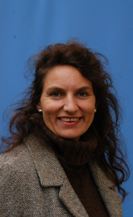About Ida Marie Høeg
Ida Marie Høeg (born 1965) is researcher at KIFO, Centre for Church Research in Oslo.
She holds a Ph.D. in Sociology of Religion at the University of Bergen (2008), entitled Ritualisation of the beginning of life. The dissertation examines pluralisation of birth and naming rituals with reference to the christening service and alternative naming ceremonies. She has been researching in the field of sociology of religion and ritual studies for more than a decade. The findings from her research have been published in various articles and edited collections.
Her current research involves examining the impact of religion on ritual actions, arenas and actors connected to the disaster of 22 July 2011.
Recent publications:
- "Silent actions - emotion and mass mourning rituals after the terrorist attacks in Norway on 22 July 2011". In: Mortality. (In print)
- "'Nå er du hos Gud. Jeg vet ikke hvilken Gud du er hos, men du har det sikkert veldig bra.' Religion og ritualer ved død i skolen." with Hans Stifoss-Hanssen Norsk pedagogisk tidsskrift 2014 (4):4
- Den offentlige sorgen. Markeringer, ritualer og religion etter 22. juli (The Public Grief - events, rituals and religion after July 22) Editor with Olaf Aagedal and Pål Ketil Bodvar. Oslo University Press 2013.
- "Rituals of Death in a Norwegian School Context" (2013) In Deconstructing Death - Changing Cultures of Death, Dying, Bereavement and Care in the Nordic Countries. (Editor: Michael Hviis Jacobsen) University Press of Southern Denmark.
Summary of individual project in REDO
22. July: Performance violence and public ritual response
This subproject will be conducted by Jone Salomonsen, Ida Marie Høeg and Cora Alexa Døving.
An aim of this project is to analyse how and why religious institutions in Norway became ritual arenas for protest and grief in response to Anders Behring Breivik’s violent attacks, and what it does to politics. Both Breivik’s terrorism and people’s ritualized reactions involved issues of national identity, national values and visions of how Norway can become more true to its “roots”, be it in terms of opening up boundaries or closing them off “to us”. In response to the 22 July terrorism, the Church of Norway played a leading hyper-ceremonial role. Also new collaborations between Muslim, Hindu and other Christian institutions took place.
This focus study aims to explore why religious sites, including streets and open plazas, served as popular venues in this emergency situation, giving rise to open assemblies of mourning rather than rigid communities of separation. A related aim is to understand the new ritual competence that became manifest in a population unused to gathering in congregations on a regular basis, that suddenly began to perform new ritual gestures. What roles did women and youth play? What roles do religious institutions play in the development and undertaking of public ritual actions, and what do these roles reveal about “religion” in contemporary Norwegian society? What is the potential political significance of taking ritual to the streets, and of people demanding sacred space within churched atmospheres, other than debating “true” (state) and “false” (terrorist) Christianities? Based on film analysis, field work, archival studies of the public rituals and their remains, in-depth interviews and accredited court observations from the trial of Anders Behring Breivik.
An important framing contribution will be the use of a new unorthodox methodology to gather data on the impact of 22 July on Oslo’s population two years after the fact: Charette (Plansmie in Norwegian). This is a way of organizing ideas from experts and users in an unrestricted yet structured fashion that has proved to be conducive to creativity and the development of multiple scenarios.
